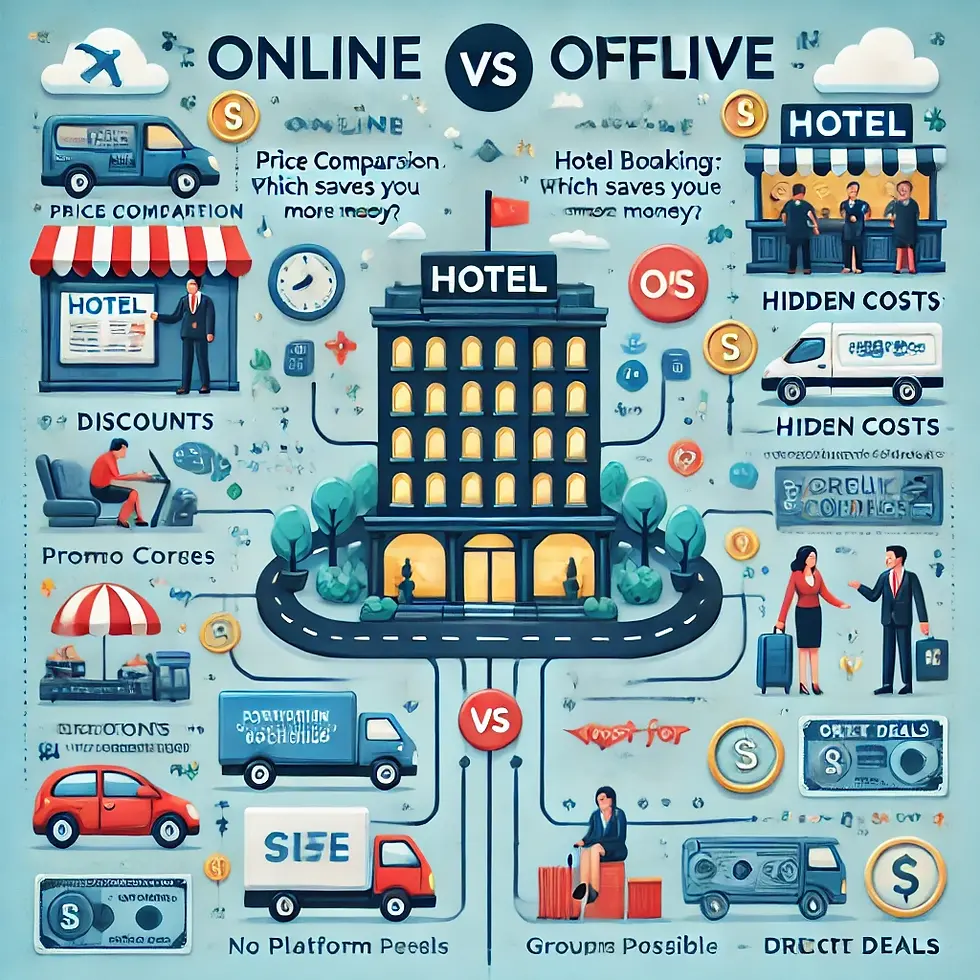Online vs. Offline Hotel Booking: Which One Saves You More Money?
- Alaukik hotel
- Feb 23, 2025
- 3 min read

Introduction of Hotel Booking
When planning a trip, one of the most crucial decisions travelers face is how to book their accommodation. Should they opt for the convenience of online booking or stick to the traditional method of offline hotel reservations? Both approaches come with their own sets of advantages and drawbacks, particularly when it comes to cost savings. In this detailed comparison, we will analyze the key differences, benefits, and potential drawbacks of each method to help you determine which one saves you the most money.

Online Hotel Booking: The Digital Advantage
1. Competitive Pricing and Discounts
One of the most significant advantages of booking hotels online is the competitive pricing offered by travel websites and hotel booking platforms. Websites such as Booking.com, Expedia, Agoda, and Hotels.com offer dynamic pricing based on real-time demand, allowing travelers to take advantage of flash sales, early bird discounts, and last-minute deals. Additionally, many hotels provide exclusive discounts for direct online bookings through their official websites.
2. Price Comparison Tools
Unlike offline bookings, where price negotiation depends on personal bargaining skills, online booking platforms allow users to compare prices across multiple hotels instantly. Meta-search engines like Trivago and Google Hotels aggregate prices from different websites, helping travelers find the best deal without manually checking multiple sources.
3. Loyalty Programs and Cashback Offers
Many online travel agencies (OTAs) and hotel websites offer loyalty programs where users earn points with each booking. These points can be redeemed for future stays, free upgrades, or discounts. Credit card partnerships with OTAs also provide cashback, making online booking an attractive option for frequent travelers.
4. Transparent Customer Reviews
Booking online provides access to customer reviews and ratings, which can help travelers make informed decisions. Unlike offline booking, where information may be limited or biased, online platforms showcase reviews from real guests, ensuring transparency.
5. Convenience and 24/7 Availability
One of the biggest benefits of online booking is the ability to reserve a room anytime, anywhere. With just a few clicks, travelers can compare hotels, check room availability, and confirm reservations. This eliminates the hassle of calling multiple hotels or relying on travel agents.
6. Hidden Fees and Cancellation Policies
While online booking provides convenience, some platforms charge hidden fees, service charges, or strict cancellation penalties. It is essential to carefully read the terms and conditions before finalizing a booking.
Offline Hotel Booking: The Traditional Approach
1. Direct Price Negotiation
One of the biggest advantages of booking a hotel offline is the ability to negotiate directly with the hotel. Unlike fixed online prices, hotels may offer lower rates when contacted directly, especially for extended stays or bulk bookings.
2. Personalized Deals and Special Requests
Travelers who prefer personal interactions can benefit from tailored deals that may not be available online. Many hotels offer special discounts for repeat guests, business travelers, or walk-in customers.
3. No Hidden Online Fees
While online booking platforms often charge service fees or commissions, direct offline bookings eliminate such additional costs. This can lead to a lower final price, especially when booking directly with the hotel.
4. Offline Travel Agents and Their Markup Costs
Traditional travel agencies may assist in hotel bookings, but they often include markup fees for their services. This means travelers may end up paying more compared to online rates unless they can secure exclusive offline deals.
5. Limited Availability and Inconvenience
Unlike online platforms that offer real-time availability updates, offline bookings may result in limited choices. Travelers must rely on phone calls, emails, or in-person visits, which can be time-consuming and inconvenient.
Which Method Saves You More Money?
1. Budget Travelers
For budget-conscious travelers, online booking generally offers the best value due to its extensive discount options, promo codes, and loyalty rewards. However, contacting hotels directly for potential discounts can sometimes yield better prices.
2. Business Travelers
Business travelers who require flexible bookings and last-minute changes may find offline booking more beneficial as hotels may accommodate changes without penalties.
3. Luxury Travelers
Luxury travelers who prioritize personalized services and exclusive packages may find better deals through direct offline bookings, as hotels often offer tailored packages for high-end guests.
4. Group Travelers
For group bookings, offline negotiations may provide better rates than online platforms, especially if booking multiple rooms at once.
Conclusion
Both online and offline hotel booking methods have their advantages when it comes to cost savings. While online booking provides competitive pricing, price comparison tools, and loyalty rewards, offline booking offers the flexibility of direct negotiations and potential hidden discounts. The best approach depends on the traveler's preferences, destination, and specific needs.







Comments